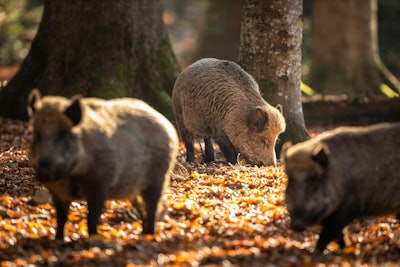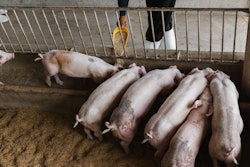
In one district of Brandenburg, there has been a recent spike in cases of African swine fever in wild boar, while authorities in a neighboring district expand and increase disease control measures.
When the African swine fever (ASF) virus was first detected in Germany in September 2020, some of the country’s first cases were identified in Spree-Neisse. Two years on, this district in the state of Brandenburg is still registering new cases of the disease in its wild boar population.
Despite the imposition of best rigorous control measures, 451 samples from wild boar and their remains have tested positive for the virus, according to the district council on November 2.
The previous month, restriction zones had to be extended in response to a spread in cases. Now the council has announced that an electric fence — positioned near a main road to prevent potentially infected wild boar entering ASF-free zones — is to be replaced with a more permanent barrier. As such a barrier is only effective if gates are kept closed, the authority is calling on local people to ensure they always close gates after they pass through them.
Located in the east of Germany, Brandenburg borders Poland, from where the ASF virus is thought to have spread to Germany. Spree-Neisse is among the Brandenburg districts located next to the Polish border.
Bordering Spree-Neisse and the state of Saxony is the district of Oberspreewald-Lausitz, where a wild boar has tested positive for ASF for the first time. The district council reports that the animal was shot dead by hunters, and the presence of the virus has been confirmed by the national veterinary agency, the Friedrich-Loeffler Institute (FLI). As a result, disease control measures have been increased and expanded in this district.
Jump in ASF cases among German’s wild boar
So far, 4,436 wild boar in Germany have tested positive for the ASF virus over the past 25 months, according to FLI (as of November 4). This is an increase of 80 cases since October 20, and 47 wild animals are confirmed infected since the start of November. Of these, 20 were found in Brandenburg, and 27 in the neighboring state of Saxony.
In the same period, ASF has also been detected in domestic pigs at seven locations in Germany. The most recent outbreak was in early July.
Recently announced was a new collaboration between scientists in Germany and Sweden investigating the survival of the ASF virus in feed ingredients and other materials under conditions found on pig farms.
Europe’s wild boar total for year passes 5,800
So far this year, 5,817 ASF outbreaks among wild boar have occurred in Europe. This is according to the latest results from the Animal Disease Information System of the European Commission (EC; as of October 28).
Registering one or more outbreaks in 2022 have been 14 of the continent’s states.
Within the wild population, recording the most outbreaks with the EC in 2022 has been Poland (1,620), followed by Germany (1,281), Latvia (697), Hungary (492), Slovakia (468) and Romania (380).
Since the previous update from this source (dated October 20), Bulgaria, Estonia, Italy, Lithuania, North Macedonia and Serbia also registered new cases in wild boar though this system.
For comparison, 12 countries confirmed with the EC one or more ASF cases among the wild population — a total of 12,150 outbreaks — during the whole of 2021.
Developments in ASF in eastern Europe
EC does not publish data on the disease situation in Russia. However, the national authority has officially reported one new case in a wild boar. According to the World Organisation for Animal Health (WOAH), the animal was shot dead in a forest in the Vladimir region in the Central federal district in October.
Meanwhile, the veterinary authority in Moldova has declared to WOAH that the ASF situation has been closed in Anenii Noi. In the first half of August, one wild boar tested positive for the ASF virus. No further cases have been reported in this eastern district.
ASF situation in European domestic swine
Since January 1, the number of confirmed ASF outbreaks in domestic pigs in Europe has reached 465.
This is according to the EC’s notification system (as of October 28). So far this year, 12 European states have officially registered one or more ASF outbreaks through this system.
For comparison, 11 European states registered a total of 1,874 ASF outbreaks with the EC over the whole of 2021.
Registering by far the most outbreaks in 2022 has been Romania with 273. This is followed by Serbia whose total has risen to 99 for the year so far, and North Macedonia (now with 28). Only these three states have reported new cases in domestic swine with the EC since the start of October.
Two Romanian farms hit by ASF
For the past three years, Romania has been battling to control ASF as the infection has spread across much of the south, central and eastern regions of the country.
While the authorities have informed WOAH regularly about new cases in domestic pigs and wild boar, the great majority of the former have belonged to small backyard herds.
Over the past 10 days, however, WOAH has been notified of two outbreaks at large commercial farms in the east Romanian county of Iasi. Around the end of October, pigs tested positive in herds of around 3,600 and almost 20,000 animals. A further 20 outbreaks reported in the country over this period involved backyard herds, each comprising between one and 28 pigs.
Disease developments elsewhere in domestic pigs
In Russia’s Central federal district, ASF has been detected again in the Kursk region. According to the WOAH notification, affected was a backyard herd of eight pigs at the end of last month. These were the first cases in this region since August 2021.
In the same district, 15 more pigs are reported to have died from ASF since July out of a backyard herd in the Yaroslavl region.
Meanwhile, Moldova’s animal health agency has officially closed an ASF outbreak series in the district of Falesti. In August and September, cases were confirmed with WOAH in three small non-commercial herds in this district in the northwest of the country. No further cases have been reported there over the past month.
View our continuing coverage of the global African swine fever situation.

















